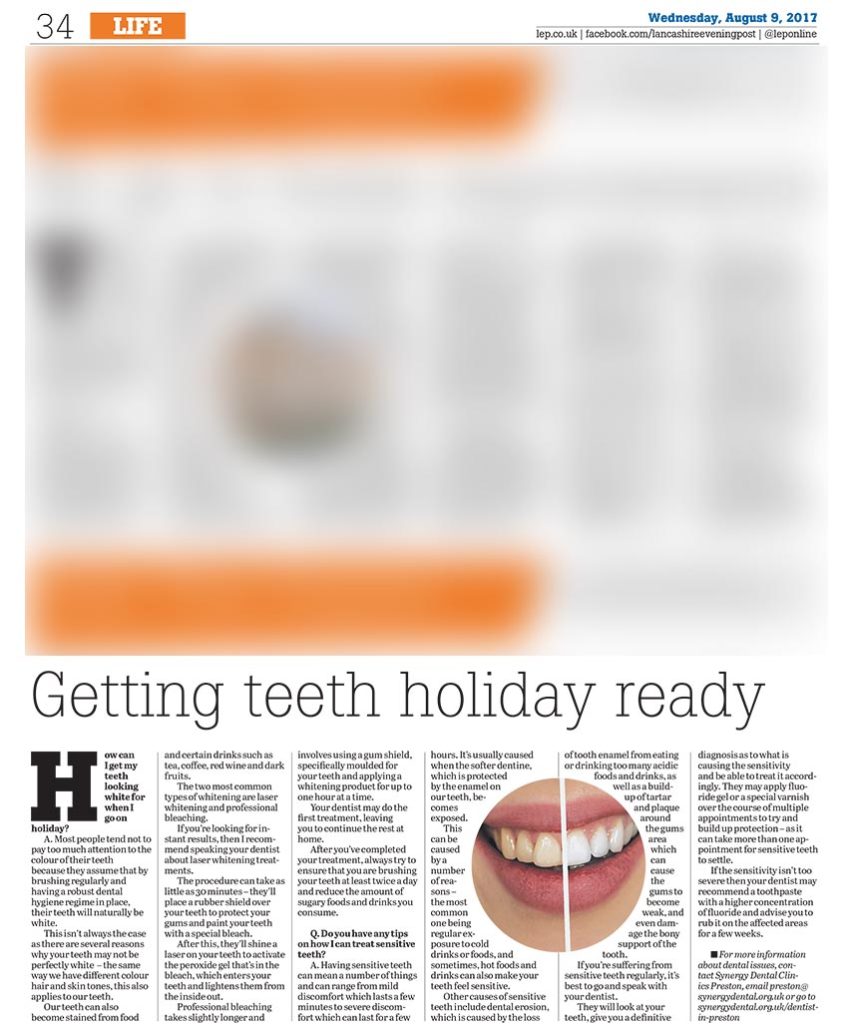Q. How can I get my teeth looking whiter when I go on holiday?
A. Most people tend not to pay too much attention to the colour of their teeth because they assume that by brushing regularly and having a robust dental hygiene regime in place, their teeth will naturally be white. This isn’t always the case as there are several reasons why your teeth may not be perfectly white–the same way we have different colour hair and skin tones, this also applies to our teeth.
Our teeth can also become stained from food and certain drinks such as tea, coffee, red wine, and dark fruits. The two most common types of whitening are laser whitening and professional bleaching. If you’re looking for instant results, then I recommend speaking your dentist about laser whitening treatments. The procedure can take as little as 30 minutes–they’ll place a rubber shield over your teeth to protect your gums and paint your teeth with a special bleach.
After this, they’ll shine a laser on your teeth to activate the peroxide gel that’s in the bleach, which enters your teeth and lightens them from the inside out. Professional bleaching takes slightly longer and involves using a gum shield, specifically molded for your teeth and applying a whitening product for up to one hour at a time.
Your dentist may do the first treatment, leaving you to continue the rest at home. After you’ve completed your treatment, always try to ensure that you are brushing your teeth at least twice a day and reduce the number of sugary foods and drinks you consume.
Q. Do you have any tips on how I can treat sensitive teeth?
A. Having sensitive teeth can mean a number of things and can range from mild discomfort which lasts a few minutes to severe discomfort which can last for a few hours. It’s usually caused when the softer dentine, which is protected by the enamel our teeth, becomes exposed.
This can be caused by a number of reasons– the most common one being regular exposure to cold drinks or foods, and sometimes, hot foods and drinks can also make your teeth feel sensitive. Other causes of sensitive teeth include dental erosion, which is caused by the loss of tooth enamel from eating or drinking too many acidic foods and drinks, as well as a build up of tartar and plaque around the gums area which can cause the gums to become weak, and even damage the bony support of the tooth. If you’re suffering from sensitive teeth regularly, it’s best to go and speak with your dentist.
They will look at your teeth, give you a definitive diagnosis as to what is causing the sensitivity and be able to treat it accordingly. They may apply fluoride gel or a special varnish over the course of multiple appointments to try and build up protection–a sit can take more than one appointment for sensitive teeth to settle.
If the sensitivity isn’t too severe then your dentist may recommend a toothpaste with a higher concentration of fluoride and advise you to rub it on the affected areas for a few weeks.
For more information about dental issues, contact Synergy Dental Clinics Preston, email preston@synergydental.org.uk or go to https://synergydental.org.uk/synergy-dental/dentist-in-preston/

